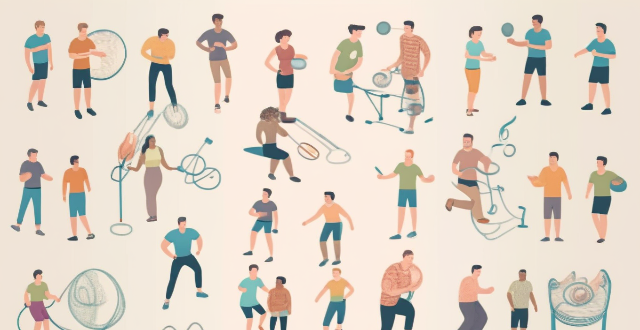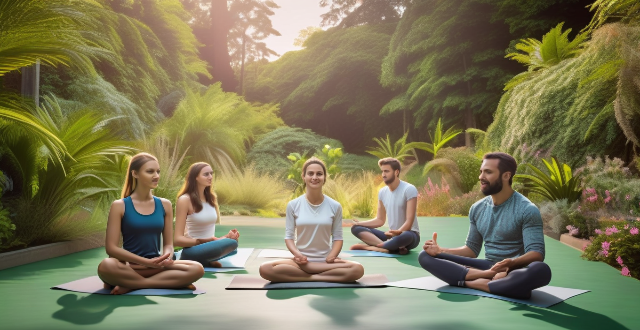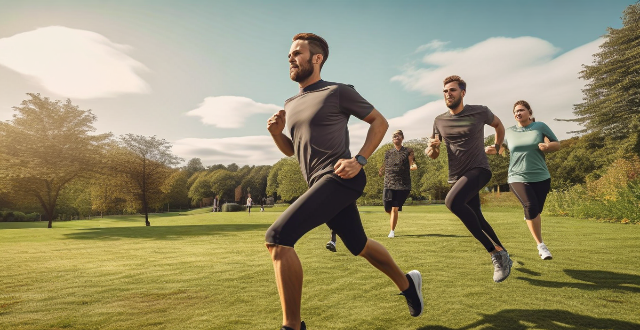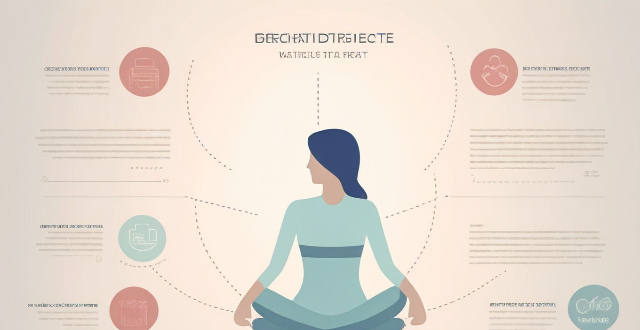Mental Meditation

Does exercise have a greater impact on mental health than meditation ?
Exercise and meditation are both beneficial for mental health, but it is difficult to determine which has a greater impact. Exercise can reduce stress and anxiety, improve self-esteem and cognitive function, and promote better sleep. Meditation can also reduce stress and anxiety, improve emotional regulation and self-awareness, and promote positive thinking. The effectiveness of each practice may vary depending on individual preferences and circumstances. It is important to choose a practice that suits your needs and engage in it regularly for optimal results.

How does meditation help in improving concentration skills ?
Meditation helps improve concentration skills by strengthening neural connections in the prefrontal cortex, responsible for executive functions. Benefits include better attention span, working memory, mental clarity, multitasking, and reduced mind wandering. To start meditating, find a quiet space, set a time limit, use guided meditations, practice consistently, and stay open-minded.

Can sport-specific meditation or mindfulness practices improve performance and mental clarity ?
Sport-specific meditation and mindfulness practices can improve performance and mental clarity for athletes. These techniques offer benefits such as improved focus, reduced stress and anxiety, and enhanced recovery. Incorporating these practices into training regimens can help athletes achieve better results.

How do athletes cope with the mental stress of competition ?
Athletes employ various strategies to cope with mental stress during competitions, including visualization and imagery, breathing techniques, goal setting, social support, mindfulness and meditation, professional help, and maintaining healthy lifestyle habits. These methods range from mental preparation techniques to seeking professional guidance and engaging in leisure activities for relaxation and enjoyment. By incorporating these strategies into their routines, athletes are better equipped to handle the psychological demands of competition.

Can yoga or meditation combined with exercise enhance emotion regulation ?
Emotion regulation is a crucial aspect of mental health, and it refers to the ability to manage and control one's emotional responses. There are various ways to enhance emotion regulation, and one of them is through physical activities such as yoga, meditation, and exercise. In this article, we will discuss how these practices can help improve emotion regulation. Yoga is a mind-body practice that combines physical postures, breathing techniques, and meditation. It has been shown to have numerous benefits for mental health, including enhancing emotion regulation. Yoga helps to reduce stress and anxiety, increases self-awareness, and promotes mindfulness. Meditation is another practice that involves focusing the mind on a particular object, thought, or activity to achieve a mentally clear and emotionally calm state. Like yoga, meditation has been shown to have numerous benefits for mental health, including enhancing emotion regulation. Meditation improves attention and focus, reduces emotional reactivity, and increases self-awareness. Exercise is another effective way to enhance emotion regulation. It reduces stress and anxiety, improves mood, and increases resilience. Combining yoga, meditation, and exercise can provide even greater benefits for emotion regulation by providing a comprehensive approach to well-being that addresses both the physical and mental aspects of emotion regulation.

Can meditation or mindfulness practices enhance sleep quality ?
Meditation and mindfulness practices have been gaining popularity for their potential benefits on mental and physical health, including improving sleep quality. These practices involve focusing one's attention on the present moment while calmly acknowledging and accepting one's feelings, thoughts, and bodily sensations. Meditation and mindfulness can enhance sleep quality by reducing stress and anxiety, promoting relaxation, and increasing awareness of sleep habits. To practice meditation or mindfulness for better sleep, individuals should set aside time each day, choose a comfortable environment, focus on their breath, cultivate gratitude and positive thinking, and be patient and persistent in their practice.

Are there specific exercises that help improve mental health ?
Exercises like yoga, meditation, aerobic exercise, resistance training, MBSR, and Tai Chi can help improve mental health by reducing stress, anxiety, and depression symptoms while promoting relaxation, self-awareness, and social interaction.

How does meditation help in reducing exam stress ?
Meditation is a practice that has been used for centuries to promote relaxation, reduce stress, and improve overall well-being. When it comes to exam stress, meditation can be a powerful tool in helping students manage their anxiety and perform better. In this response, we will explore how meditation helps in reducing exam stress. The benefits of meditation include calming the mind, improving concentration, reducing physical symptoms of stress, and promoting better sleep. Regular meditation practice has been shown to improve concentration and attention span, which is particularly beneficial for students who need to focus on studying and retaining information for exams. By improving their ability to concentrate, they can study more efficiently and effectively. Meditation has also been found to reduce physical symptoms of stress such as headaches, muscle tension, and fatigue. By reducing these symptoms, students can feel more relaxed and better prepared for their exams. Additionally, meditation has been shown to promote better sleep by reducing stress levels and promoting relaxation. By getting enough restful sleep, students can wake up feeling refreshed and ready to tackle their exams. To practice meditation for exam stress reduction, find a quiet space where you won't be disturbed or distracted. Set a time limit for your meditation session and start with shorter sessions (5-10 minutes) before gradually increasing the duration. Focus on your breath and use guided meditation recordings or apps if you're new to meditation or struggling to focus. Practice regularly to experience the full benefits of meditation. In conclusion, meditation is a valuable tool for reducing exam stress and improving overall well-being. By calming the mind, improving concentration, reducing physical symptoms of stress, and promoting better sleep, meditation can help students feel more prepared and confident when facing their exams. Incorporating regular meditation practice into their routine can help students reap the benefits and approach their exams with a sense of calm and clarity.

What are the best exercises for improving mental health ?
Engaging in regular physical activities is crucial for maintaining good mental health. Some of the best exercises for improving mental health include cardiovascular exercises like running, cycling, and swimming; strength training exercises like weightlifting, resistance bands, and bodyweight exercises; and yoga and meditation practices like Hatha yoga, mindfulness meditation, and Tai Chi. By incorporating these exercises into your routine, you can reduce stress and anxiety levels while also improving overall well-being.

How do celebrities manage their mental health amidst hectic schedules ?
Managing mental health is crucial for celebrities with hectic schedules, and they employ various strategies to maintain their well-being. These include prioritizing self-care through exercise, healthy eating, and sleep; seeking professional help when needed; setting boundaries to avoid burnout; building a support system of friends, family, and colleagues; engaging in hobbies and interests for stress relief; and practicing mindfulness and meditation to reduce anxiety. By implementing these strategies, celebrities can maintain good mental health and thrive both personally and professionally.

How does yoga combine physical activity with mental relaxation ?
Yoga integrates physical activity and mental relaxation through various practices like asanas, pranayama, dhyana, and dharana. Asanas improve flexibility, strength, and endurance, while vinyasa increases heart rate for cardiovascular exercise. Pranayama techniques enhance lung capacity and stamina. Meditation calms the mind, and concentration practices sharpen focus. Yogic philosophy promotes emotional stability. Mindful movement connects physical practice with mental awareness, synchronized breath reduces strain, and restorative poses allow for deep relaxation. Overall, yoga offers a holistic approach to wellness by harmoniously blending body and mind.

How can mental toughness be developed in athletes through sports psychology ?
The article discusses the importance of mental toughness in sports and how sports psychology can help athletes develop this quality. It outlines six ways that sports psychologists can assist athletes in developing mental toughness, including goal setting, self-talk, visualization techniques, stress management, mindfulness practices, and team building activities. These strategies can enhance resilience, focus, and motivation in athletes, leading to success in their chosen sport.

How can we promote self-care and self-love for women's mental health ?
Promoting self-care and self-love for women's mental health requires a comprehensive approach that includes creating awareness, providing resources, and establishing supportive environments. This involves understanding the importance of mental health, dispelling misconceptions, normalizing conversations, providing accessible information, offering therapeutic support, building community networks, implementing workplace initiatives, advocating for policies, encouraging mindfulness and meditation, promoting healthy lifestyle habits, and fostering self-reflection and growth. By adopting these strategies, we can empower women to take charge of their mental health and lead fulfilling lives.

How can educational psychology aid in addressing students' mental health issues ?
Educational psychology can aid in addressing students' mental health issues by understanding the role of emotional intelligence, promoting a positive school climate, providing early intervention and support services, encouraging self-care and resilience, and facilitating collaboration between educators and mental health professionals.

How do health management apps help individuals manage stress and improve mental wellbeing ?
Health management apps offer various features to help individuals manage stress and improve their mental wellbeing, including mindfulness exercises, sleep tracking, physical activity tracking, nutritional guidance, social support, relaxation techniques, goal setting, and educational content.

How does meditation or mindfulness practice contribute to creative development ?
Meditation and mindfulness practices can significantly foster creativity by enhancing attention, increasing awareness, reducing mental clutter, promoting emotional regulation, stimulating neurological growth, fostering a growth mindset, improving sleep quality, encouraging self-reflection, providing incubation time, and enhancing collaboration. Incorporating these practices into daily routines can help individuals unlock their full creative potential, leading to personal growth and innovation in various fields.

How can schools improve student mental health ?
Improving student mental health is crucial for academic success and overall well-being. Schools can help by creating a supportive environment, implementing mental health programs, providing access to resources, promoting healthy habits, addressing bullying and harassment, offering extracurricular activities, monitoring academic pressure, and encouraging self-care. By implementing these strategies, schools can create an environment that supports the mental health of all students, allowing them to thrive both academically and personally.

What role does mental health play in the overall fitness regime of popular celebrities ?
This article explores the importance of mental health in maintaining a healthy lifestyle and how celebrities incorporate it into their fitness routines. It discusses stress management, motivation and discipline, emotional well-being, mindfulness practices, personal trainers and coaches, and balanced diet and sleep as key components of celebrity fitness regimes that prioritize mental health.

How does meditation help in reducing stress levels ?
Meditation is a practice that helps in reducing stress levels by calming the mind and body, improving concentration, promoting emotional health, increasing self-awareness, and enhancing mindfulness. It is a powerful tool for managing stress effectively and leading a happier, healthier life.

How can mental training improve physical abilities in athletes ?
Mental training is crucial for athletes as it enhances physical abilities by improving focus, managing stress, and promoting a positive mindset. Techniques such as visualization, self-talk, and emotional intelligence contribute to better performance.

How do sports competitions influence stress levels and mental readiness ?
Sports competitions can significantly impact stress levels and mental readiness. Performance pressure, fear of failure, winning obsession, and physical exertion can increase stress levels, while confidence building, goal achievement, camaraderie, and mindfulness practices can decrease them. Similarly, focus and concentration, resilience, mental toughness, and visualization techniques can improve mental readiness, while overthinking, perfectionism, lack of self-belief, and external factors can impair it. Overall, sports competitions provide opportunities for growth, learning, and personal development but also present challenges that require effective coping strategies to manage stress levels and maintain mental readiness.

How do celebrities influence the perception of mental health and wellness among their followers ?
Celebrities significantly influence their followers' perception of mental health and wellness. They can positively impact by sharing personal struggles, promoting wellness practices, and reducing stigma around mental health issues. However, they might also negatively affect through glamorizing stressful lifestyles, overemphasizing appearance, promoting unhealthy coping mechanisms, sharing misinformation, and setting unrealistic expectations about recovery. It is crucial for followers to critically engage with celebrity content regarding mental health and seek professional guidance when needed.

What role does religion play in athletes' mental preparation for competitions ?
The role of religion in athletes' mental preparation for competitions is significant as it provides motivation, coping mechanisms, resilience, team cohesion, moral guidance, and spiritual fulfillment. Religion can serve as a source of inspiration and help athletes manage stress and anxiety. It also enhances their mental toughness and fosters unity among teammates. Moreover, religion guides athletes in making ethical decisions and offers spiritual fulfillment, contributing to their overall well-being. However, the impact of religion on athletic performance varies depending on individual beliefs and experiences.

Are there any specific types of exercises that are more effective for stress relief ?
There are several types of exercises that have been shown to be particularly effective for reducing stress and promoting relaxation, including aerobic exercise, yoga, tai chi, resistance training, and meditation. These activities can help to release endorphins, improve cardiovascular health, increase flexibility and strength, provide a sense of accomplishment, and quiet the mind, all of which can contribute to lower stress levels and improved mental well-being.

What role does discipline in sports play in achieving personal goals and mental resilience ?
The text discusses the importance of discipline in sports for achieving personal goals and building mental resilience. It outlines key aspects such as setting clear objectives, consistent practice, overcoming obstacles, self-regulation, focus and concentration, and resilience under pressure. The article emphasizes that discipline not only enhances physical performance but also strengthens mental fortitude, enabling athletes to reach their full potential and thrive in their respective sports.

What are the effects of pregnancy and motherhood on women's mental health ?
The article discusses the impact of pregnancy and motherhood on women's mental health, highlighting both positive and negative effects. Positive effects include increased responsibility, improved social support, and enhanced emotional connection with the child. Negative effects may involve postpartum depression, anxiety disorders, and trauma-related disorders. Coping strategies such as seeking professional help, building a support network, and practicing self-care are recommended to manage any mental health challenges that arise during this period.

How does mental toughness impact athletic performance at a competitive level ?
In summary, this article explores the impact of mental toughness on athletic performance at a competitive level. It highlights the benefits of mental toughness, including enhanced focus and concentration, improved resilience and coping mechanisms, increased confidence and self-belief, and better decision making under pressure. The article also provides practical tips for developing these essential skills through mindfulness techniques, visualization, positive self-talk, scenario training, and continuous self-improvement. Overall, mental toughness is crucial for athletes to perform at their best and achieve success in their chosen sport.

What strategies can coaches use to foster resilience and mental toughness in their athletes ?
Strategies for Coaches to Foster Resilience and Mental Toughness in Athletes: Emphasize the Importance of Mindset: Encourage positive self-talk, visualization techniques, and goal setting. Build a Supportive Environment: Create an open communication environment, promote teamwork, and provide constructive feedback. Teach Coping Mechanisms: Introduce stress management techniques, problem-solving skills, and time management strategies. Incorporate Adversity Training: Simulate pressure situations, discuss overcoming setbacks, and incorporate physical challenges. Lead by Example: Model resilience, share personal experiences, and show a commitment to continuous learning.

Is there a link between sedentary lifestyle and increased risk of mental health disorders ?
This article explores the link between sedentary lifestyle and increased risk of mental health disorders such as depression, anxiety, and stress-related disorders. It suggests that lack of exercise can contribute to these issues due to decreased endorphin release and higher cortisol levels. The article recommends increasing physical activity, taking frequent breaks from sitting, and practicing mindfulness and stress-reduction techniques to reduce these risks.